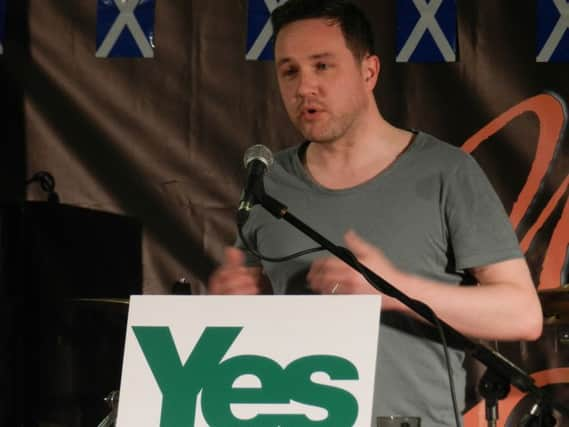Euan McColm: Artists have been betrayed by SNP


As tempers on both sides frayed, along would come a piece of work so execrable that the only response was to laugh. Unintentionally comical poems and paintings (Alex Salmond astride a weeping unicorn, anyone?), baffling columns by writers cross that David Bowie was in favour of the UK, and a whimsical charabanc trip by members of the National Collective group all added considerably to the gaiety of the nation.
But things stopped being funny when the writer Alan Bissett appeared on stage at the SNP’s annual conference to perform part of his soon to be staged pro-independence play The Pure, The Dead, And The Brilliant. Bissett had styled himself as a radical; one appearance at a pro-independence rally ended with him closing his eyes and raising his fist in the style of a Black Panther militant. But there he was, appearing at the annual conference of the party of Scottish government.
Advertisement
Hide AdAdvertisement
Hide AdBissett had crossed a line. Regardless of what arguments he went on to make in favour of independence, the image remained of him on that SNP platform. Bissett had marked himself out as a stooge.
He and other high profile Yes supporters from the world of the arts frequently spoke of being part of a grassroots movement. Theirs was not a party political campaign but an attempt to recreate Scotland. And that was all smashing until Bissett stood up in front of thousands of SNP members.
There were others, too, who crossed the line between artist and propagandist. It was more often than not the case that, when high profile artists were invited to make their views known, those views echoed the Scottish Government’s case as laid out in the white paper on independence.
And if artists’ closeness to ministers was discomfiting, the claims many made for the benefits to the arts of independence were laughable. Constitutional change would be, they insisted, the catalyst for an outpouring of creativity. It was as if the United Kingdom acted as a block on imagination.
But while there were lots of big claims made for the consequences of a Yes vote, there wasn’t much detail. How exactly would better, bolder novels come to be written? Why would Scottish independence lead to more successful home-grown cinema? How would constitutional change give birth to more perceptive art?
There were no answers to questions like those because the case being prosecuted by artists in favour of independence was, for the most part, bollocks; a poorly considered mishmash of platitudes about “hope” and blind assertions of a creative renaissance to come. For a while, back then, artists and “creatives” who support Scottish independence were useful to SNP ministers. They helped fight impression that the Yes Scotland campaign was just the SNP and a handful of front organisations.
A fat lot of thanks those artists have just been given. In his budget statement to the Scottish Parliament last week, Finance Secretary John Swinney announced cuts to the funding of all of Scotland’s national performance companies. Between them, the National Theatre of Scotland, Scottish Opera, Scottish Ballet, the Royal Scottish National Orchestra and the Scottish Chamber Orchestra will have to share the burden of £5 million in cuts. Add to that cuts in funding for museums, libraries and to Creative Scotland, and it means a cut to the annual culture budget of almost £20m.
This is desperately bad news. Public funding of the arts is essential if they are to flourish. On this, I am sure the former members of the now-defunct National Collective would agree.
Advertisement
Hide AdAdvertisement
Hide AdScotland’s artists should be angry this week. They should be fighting against a government decision that will make it that bit more difficult for young Scots to realise their creativity.
Those artists and writers who stood shoulder-to-shoulder with the government last year have been given a brutal lesson in what it means to be a useful idiot.
The independence campaign has had, I believe, a dreadful impact on Scottish culture. It so often seemed that pro-Yes artists wished to dictate what represented appropriate art. In one particularly unfortunate incident, the aforementioned Bissett became involved in an embarrassing public spat with the organisers of a book festival who had dared to criticise the quality of a piece of pro-independence poetry. Bissett’s position was that the fact of the poet’s Scottishness was enough to make inappropriate any criticism of his work by a Scottish organisation. Not only were Scottish artists not to question the Scottish Government, they were not to question themselves.
But the referendum is over – not to return for some time – and Scottish artists (if they are truly so, with the engines that drive artists) have been betrayed by the politicians in whom they placed so much faith.
But who among them can credibly speak out? So many Scottish artists have spent the last couple of years more concerned with getting selfies with government ministers than with producing thought-provoking work that it is hard now to take their work seriously. There are too many Stepford scribes, out there, who’d rather continue examining what might have happened had the result of the referendum been different than start examining Scotland now, under the new SNP establishment.
Great, challenging art does not spring from adherence to political manifestoes. Many referendum-inspired poems remain, scattered around the internet and in darker corners of the self-publishing world, as (entertaining) proof of that.
The SNP has been hugely successful in persuading Scottish voters that it has their - and the country’s - best interests at heart. But it is Scotland’s interests for a healthy arts scene to blossom. The Scottish Government is failing Scotland’s artists. It’ll take more than a National Collective wish tree to mitigate against the cuts about to fall. «